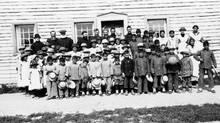Ottawa Taken to Court over Release of Residential-Schools Documents
By Gloria Galloway
The commission examining the treatment of aboriginal children at Canada’s residential schools is taking the federal government to court for refusing to release millions of documents that were supposed to form a permanent and public record of the abuses committed. The Truth and Reconciliation Commission (TRC) – established in 2008 as part of the settlement between former students, the Canadian government, the churches that ran the schools, and others – has asked an Ontario Superior Court judge to decide whether Canada is obligated to hand over the material. Prime Minister Stephen Harper apologized in 2008 for the forced assimilation of more than 150,000 first nations, Inuit and Métis children at the schools. However, Ottawa’s failure to produce the documents threatens to undermine the aboriginal community’s faith in the government, says the Assembly of First Nations. The commission has been provided with almost a million documents over the past 12 months, all of them held by the Department of Aboriginal Affairs. But it contends that millions, and possibly tens of millions, are being withheld. In addition to what may still be with Aboriginal Affairs, some are in the possession of other departments, some are stored within Library and Archives Canada, and some are church records obtained by the government. For instance, the commission has received no documents from the RCMP. Parents complained to police at the time their children were in the residential school system that their children were being abused or had even disappeared. Survivors believe there may be documents in the possession of the national force that would help them determine what happened to those complaints. The government cannot get away with releasing a million documents when millions more remain undisclosed, said Julian Falconer, the commission’s lawyer. “Put simply, a half loaf in the form of one million documents isn’t going to do it,” he said. “What is at stake here is control over history.” The commission said in an interim report last February that it had hit a wall in its attempts to pry the documents out of Ottawa’s hands. In an application for legal intervention, it says the stonewalling continues and the government has provided only a subset of an existing database of known material. “The commission is taking this step very reluctantly and with a sense that it has been left with no alternative,” Justice Murray Sinclair, the commission’s chairman, said in a statement. The commission’s application will be heard by Justice Stephen Goudge on Dec. 20 and 21 in Toronto. Judge Goudge is being asked to decide whether the commission’s term should be extended as a result of the delay in the production of the documents. Jason MacDonald, a spokesman for Aboriginal Affairs Minister John Duncan, said the government remains committed to bringing closure to the legacy of residential schoolsand it will continue to honour the settlement. “We are working with 22 other government departments and with the TRC to ensure all relevant Indian Residential Schools related documents are made available to the TRC,” Mr. MacDonald said in an e-mail. “Canada aims to disclose all of its remaining documents relevant to the TRC’s mandate by June 30, 2013.” But the commission argues that Ottawa has “erected a myriad of obstacles” to avoid fulfilling its obligations. According to court documents filed by the commission, the government has taken issue with the commission’s interpretation of “relevant,” has not agreed to compile all of the documents housed in the Library and Archives in a organized manner, has withheld documents obtained from the churches, and has failed to produce documents produced by other departments. The commission argues that the government should not be allowed to rely on privacy considerations or cabinet confidence to keep the documents from being released. And it wants the government to bear what could end up being the very large cost of copying reams of original material that has been gathered over the decades. Ken Rubin, an expert in accessing government documentswho has been working on this issue for a number of weeks, said the government is still arguing over what is and is not a relevant record. “Get on with it fellows,” said Mr. Rubin, “this is not a matter that you are going to play petty politics with. This is national reconciliation and history that’s at stake.”
|
.
Any original material on these pages is copyright © BishopAccountability.org 2004. Reproduce freely with attribution.
